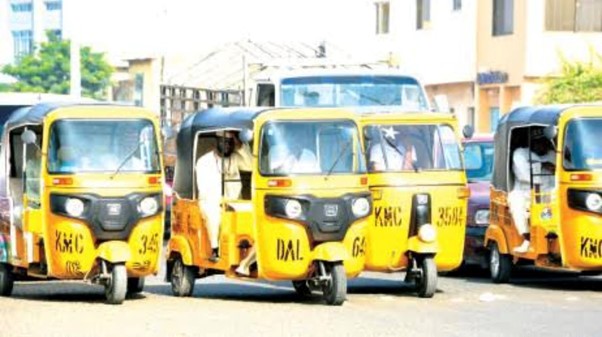Tricycle Operators’ Strike Leaves Commuters Stranded In Kano
Economic activities suffer in Kano, Northwestern Nigeria after tricycle operators embarked on a warning strike.

Tricycle operators in Kano State, Northwestern Nigeria, Monday commenced an indefinite strike over a series of allegations against the Kano Road Traffic Agency (KAROTA).
The allegations include extortion, over-taxing and bad roads.
Locally known as ‘Adaidaita Sahu’, the yellow-painted tricycles are the primary means of transportation in Kano, Nigeria’s largest commercial city. The tricycles are also a major source of livelihood to many young people who are the operators.
On Monday, the operators withdrew their services, leaving thousands of schoolchildren, traders and other commuters stranded.

Zahraddeen Yahaya, a tricycle operator, told HumAngle that he and others decided to stay away from the road to register their frustrations against the operatives’ highhandedness KAROTA.
Yahaya noted that Kano State’s road conditions have become worrisome, despite the different taxes they pay to the agency.
“There are no street lights and no road signs everywhere. KAROTA personnel hide and wait for you to make a mistake and charge you for an offence,” he lamented.
Yahaya said N18,000 was paid last year to operators for the tricycle tracker that the KAROTA has not given despite the payment.
“Eighteen-thousand is a huge amount for a tricycle operator. But we still paid the amount because we didn’t want trouble,” he said.
He complained about the bad roads in every part of Kano affecting their transportation services, despite tax payment.
Baffa Babba Danagundi, the Managing Director of KAROTA, recently requested the operators pay a levy of N100 that must be paid online via REMITA at a bank.
This was coming after changing his initial stance on the cumulative payment of tax for a year after the operators protested against it.
Dan-Agundi said the operators can now pay the daily N100 tax but have to pay via REMITA at a bank or face the wrath of the KAROTA.
However, the tricycle operators demanded that the amount should be paid manually along the road as paying at a bank or an internet cafe would affect their daily work.
Dan-Angundi, in an interview with Freedom Radio Monday morning, said he was aware of the warning strike, and the government was not worried about it.
“Let me tell them that the government is not worried about their strike. At least, it has made Kano roads quiet. I know they cannot withstand this strike,” he said.
“This strike is temporary. I know they cannot stay at home for a period of one month. I dare them to stay at home for a month without shelving the strike.”
Some of the stranded commuters who spoke to journalists lamented how the strike had affected them.
They urged the state government and the tricycle operators to embrace dialogue for the benefits of residents.
“I am a secondary school teacher. I didn’t know the strike would take place, only for me to spend over an hour here waiting for a vehicle to transport me to my place of work,” a secondary school teacher who identified herself as Suwaiba told Daily Nigerian.
“I don’t think I can make it to the school today because the first period has already gone. I’m not happy about this development.”
“I call on the government and the tricycle operators to resolve this matter amicably as it will affect many areas of development, especially education and economy,” she added.
Support Our Journalism
There are millions of ordinary people affected by conflict in Africa whose stories are missing in the mainstream media. HumAngle is determined to tell those challenging and under-reported stories, hoping that the people impacted by these conflicts will find the safety and security they deserve.
To ensure that we continue to provide public service coverage, we have a small favour to ask you. We want you to be part of our journalistic endeavour by contributing a token to us.
Your donation will further promote a robust, free, and independent media.
Donate HereStay Closer To The Stories That Matter




